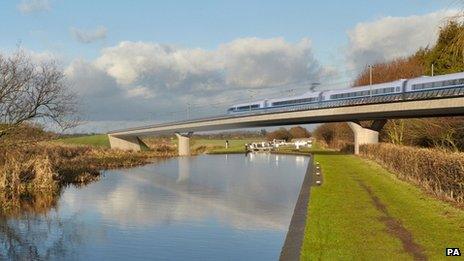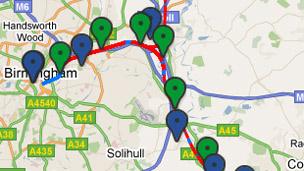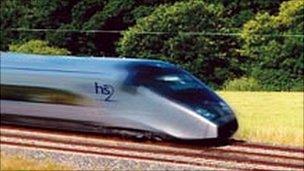HS2 cost and benefit debate not over
- Published
- comments

With cross-party support as well as backing from business and union leaders, the high speed rail link between London and Birmingham is likely to be approved
The idea that the proposed HS2 high-speed rail link between London and Birmingham, and eventually beyond to Manchester and Leeds, would bring vast economic benefits for the UK lies behind the government's intention to invest some £32.7bn in the project.
The government insists the HS2 project will bring between £41.4bn to £46.9bn of economic benefits over a period of six decades, ranging from income from ticket sales to reduced congestion on the roads and the creation of hundreds of jobs.
If this is indeed so, it is clearly a no-brainer: Investing £32.7bn to reap £46.9bn obviously makes sense.
Indeed, the project has cross-party support and is backed by some of the country's most senior economists and business leaders, as well as by many MPs and by union leaders such as RMT head Bob Crow and Len McCluskey, general secretary of Unite.
Network Rail, which owns and operates the UK's rail infrastructure, has also thrown its weight behind the project, having dismissed alternative proposals to upgrade the existing railways as too costly and disruptive.
Nimby arguments
But there are also plenty of those who have challenged the government's assumptions and calculations.
Many who live along the proposed route are naturally opposed to the project.
One major reason is obviously the prospect of years of disruptive construction work, followed by up to 28 trains an hour screaming past their homes and villages at speeds of up to 250mph (400km/h).
However, fed up of being portrayed as Nimbys ("Not in my back yard"), the locals along the proposed railway line have tended to focus less on the impact on their own rural lifestyles.
Instead, they highlight other - arguably rather more objective - reasons why it should not go ahead.
The government's case in favour of HS2 is naturally based on a number of assumptions that opponents have worked hard to discredit.

Many who live along the HS2's proposed route fear their communities could suffer
The Campaign to Protect Rural England, for instance, has expressed doubts , external about the government's carbon forecasts for HS2.
But the main arguments relate to the economic assumptions behind the government's analysis of the costs and economic benefits.
The Institute of Economic Affairs (IEA), which is arguably the most vocal think tank opposed to HS2, predicts that costs will be greater while the economic benefits will be lower, external than the government has forecast.
The overall costs would be higher for a number of reasons, the IEA insists, ranging from minor costs such as compensation for disruption during the construction work being paid to season ticket holders, to major expenses arising from a resulting need to expand and upgrade Euston station and transport links to and from the station.
Moreover, it says, when operating costs are added to the initial investment, the overall cost of HS2 increases to some £44.3bn.
Overall revenue from ticket sales and such are unlikely to exceed £27.2bn, the IEA calculates.
But the central argument against HS2 put forward by the IEA is that the business case is based on an overly optimistic prediction about how much and how fast demand for long distance train travel will grow.
The Taxpayers' Alliance, another vocal opponent of the project, claims that "the business case is based on a 27% over inflation rise in fares" and calculates that "if that does not take place revenue is likely to be at least £10bn lower, external".
Meanwhile, the cost of servicing government debts of some £30bn to finance the project would be £1.3bn a year during a decade of construction, the Taxpayers' Alliance claims
And it says that "mitigating the environmental effects of the line, for example by running portions of it underground, is likely to add at least £3bn to the cost".
Hidden costs
The IEA also points to a number of hidden costs that it says have not been included in the government's calculations, such as the impact on the people who currently live in or visit the Chilterns, an "area of outstanding natural beauty".

The value of the nature through which the fast trains would cut is difficult to calculate
"Quantifying such costs is highly problematic, since valuations are highly subjective, but nevertheless the impact is likely to be significant," it argues.
Similarly difficult to quantify, it reasons, are the costs involved when so-called "social capital" is destroyed as a result of "communities being broken up and dispersed as a result of compulsory purchase and/or general planning blight".
Rush-hour delays and longer commuting times for people who live near Birmingham Interchange or Euston station in London could result as the volume of traffic is set to increase, and again it is difficult to estimate the precise economic cost, the IEA reasons.
Imprecise analysis
The government insists it has listened to all the arguments put forward by the HS2 opponents - including many more that have not been mentioned in this article.
And, in putting forward its latest benefit analysis, it predicts that the completed HS2 network will bring in an additional £31bn in rail revenues, and economic benefits of £42.7bn.
The benefit cost ratio (including wider economic benefits) for HS2 is £1.80-2.50 benefits for every £1 spent on the cost of the project.
"The BCR has been revised downwards slightly due to the current economic climate but remains convincing," says the government.
But the harsh truth is that any cost/benefit analysis of a project of this size that is set to last for decades will be imprecise.
This is partly because it must be based on predictions, but also because it will have to make choices about which costs and benefits should be included in the calculations.
If built, it will be decades before anyone will be in a position to say whether HS2 has been an economic success - and chances are we will never know.
After all, even retrospective calculations are based on choices about which costs and benefits to include, and it is unlikely that opposing parties to this argument will ever agree on that.
- Published10 January 2012
- Published10 January 2012
- Published10 January 2012
- Published10 January 2012
- Published10 January 2012